|
 Sea
Sea
by John O'Leary, Zim
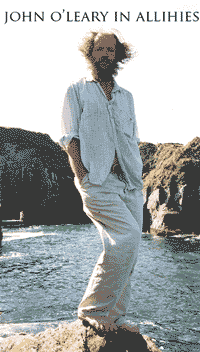 John O'Leary - toggle-haired, thin-boned,
gypsy-looking - lives at the edge of the world
where the land meets the sea.
John O'Leary - toggle-haired, thin-boned,
gypsy-looking - lives at the edge of the world
where the land meets the sea.
The wave's radiant hand
how it wants,
how it reaches, how
it withdraws
|
Sea is a collection of sonnets, 77 in all,
completing the 77 in O'Leary's earlier companion
volume, Salt - on love, dump and weep, the triad
that now defines the modern relationship. The set
of sonnets that make up Sea bring the reader
closer to the poet's world, Allihies on the Beara
Peninsula in the south-west of Ireland. If Salt
is about love and longing, Sea is about belonging
and identity.
It's so different seeing
the land from the sea -
it seems\so easy,
and so temporary,
the way I can feel
your voice in my hands.
I was building with stones today -
desire is like that,
made of amazingly heavy
not-at-all heavenly
bodies, a landfall,
at first immaterial,
later, grasping and gravid and holding me
|
Review: RA
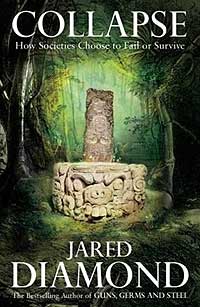 Collapse:
Collapse:
How Societies Choose to Fail or Survive
by Jared Diamond, Penguin/Allen Lane
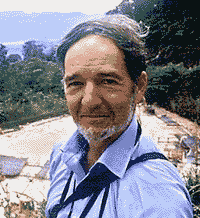 There are those who will see this book as the
story of the 'Vanished Edens', will read Jared
Diamond's analysis and somehow fail to see what
he is really saying. If this book is merely an
environmental history of human society it will be
as worthless as the books that preceded it,
notably Clive Ponting's A Green History of the
World. Great reading but not a lot of use to the
ecological and social problems that face modern
societies.
Diamond takes a different approach to
Ponting. His is a cultured, scientific approach,
the same style that won him a Pulitzer Prize for
non-fiction [for Guns, Germs & Steel]. For most of the book Diamond lets
the reader work it out by reading between the
lines. Near the end he spells it out:
"For the
most part we 'just' need the political will to
apply solutions already available. Of course
that's a big 'just'. But many societies did find
the necessary political will in the past."
This is a book about the dangers our modern societies
face, the same dangers ancient and older
civilisations faced and either failed or
survived. Diamond is an optimist but he is also a
realist who knows that the dangers facing
civilisation today are global, not local. There
is no more new frontier.
Review: RA
There are those who will see this book as the
story of the 'Vanished Edens', will read Jared
Diamond's analysis and somehow fail to see what
he is really saying. If this book is merely an
environmental history of human society it will be
as worthless as the books that preceded it,
notably Clive Ponting's A Green History of the
World. Great reading but not a lot of use to the
ecological and social problems that face modern
societies.
Diamond takes a different approach to
Ponting. His is a cultured, scientific approach,
the same style that won him a Pulitzer Prize for
non-fiction [for Guns, Germs & Steel]. For most of the book Diamond lets
the reader work it out by reading between the
lines. Near the end he spells it out:
"For the
most part we 'just' need the political will to
apply solutions already available. Of course
that's a big 'just'. But many societies did find
the necessary political will in the past."
This is a book about the dangers our modern societies
face, the same dangers ancient and older
civilisations faced and either failed or
survived. Diamond is an optimist but he is also a
realist who knows that the dangers facing
civilisation today are global, not local. There
is no more new frontier.
Review: RA
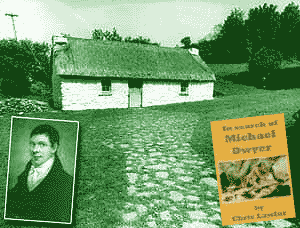 In Search of Michael Dwyer
In Search of Michael Dwyer
by Chris Lawlor, Dunlavin
The myths that surround the west Wicklow United
Irishman Michael Dwyer are pervasive in Irish
society at home and among the Diaspora. So a book
that tells the true story comes as a welcome
change to the revisionist histories.
Written by Wicklow historian Chris Lawlor, In Search of
Michael Dwyer is carefully structured to
highlight the crucial elements in the life of the
man the British crown forces could not bring to
heel for five years.
Celebrated as the hero of
the 1798 rebellion, Dwyer held out in the Wicklow
mountains for five years, often escaping his
enemies because of his knowledge of the people
and their landscape. The Wicklow mountains are
today a harsh environment, yet Dwyer felt as much
at home within their embrace as he did in the new
civilisation that was being imposed on the rural
people - who were always people of the land and
happy to work the land in ways that today we
would describe as sustainable. Dwyer would not
have survived in the mountains without an
intimate knowledge of the flora and fauna.
Which
is why he was never caught.
Review: RA
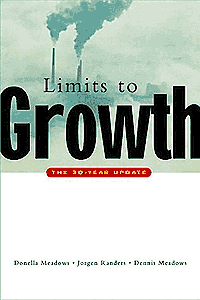 Limits to Growth
Limits to Growth
(The 30-year update)
by Meadows, Randers and Meadows, Earthscan
Has human society really wasted 30 years since
this book was first published in 1972? Three
decades ago Dana Meadows warned that humans were
about to overshoot their carrying capacity.
Overshoot is the key word in this book and this
time the authors - Dennis Meadows and Jorgen
Randers completing Dana Meadows' work (she passed
away in 2001) - present ten scenarios for the
21st century. Some are optimistic, some are
pessimistic. But the reality is still the same -
overshoot is the result of rapid growth, a limit
to that growth and finally the failure to
recognise and stay within that limit - resulting
in overshoot.
Not surprisingly the authors
advocate sustainability as the solution to avoid
overshoot. Sustainability, they state, is the
next revolution. In the chapter on Tools for the
Transition to Sustainability they spell out the
structure for survival - visioning, networking,
truth-telling, learning and loving.
Seems so
simple, doesn't it.
Review: RA
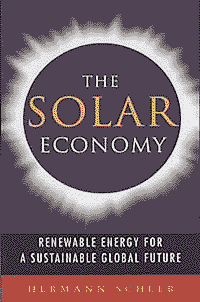 The Solar Economy:
The Solar Economy:
Renewable Energy for a Sustainable Global Future
by Hermann Scheer, Earthscan
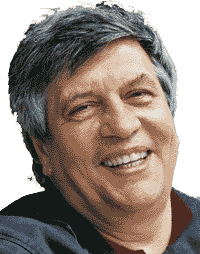 Energy is now a political issue. It ceased to be
an environmental problem many years ago.
Although
slightly out of date (it was first published in
German in 1999), Dr Scheer's book is the bible
for those countries who want to plan a solar
economy as part of their state policy and make
solar energy available to communities. As a
member of the German parliament, Dr Scheer's
analysis is based on the pragmatic choices modern
Germany (and neighbouring Switzerland) had to
make to start introducing a solar economy.
This is the blueprint.
Dr Scheer:
Energy is now a political issue. It ceased to be
an environmental problem many years ago.
Although
slightly out of date (it was first published in
German in 1999), Dr Scheer's book is the bible
for those countries who want to plan a solar
economy as part of their state policy and make
solar energy available to communities. As a
member of the German parliament, Dr Scheer's
analysis is based on the pragmatic choices modern
Germany (and neighbouring Switzerland) had to
make to start introducing a solar economy.
This is the blueprint.
Dr Scheer:
"The globalisation
process is a roller-coaster ride driven by fossil
fuels. The faster it goes, the more frightening
and bruising a ride it is for human passengers
and the natural world alike. Dwindling numbers of
people are able to climb aboard, while growing
proportions are tossed out of the carriage. By
contrast, the new division of labour in the solar
economy to come encompasses a whole variety of
swings and roundabouts, some small, some large,
all offering a much calmer ride, much less
violent to - and more under the control of -
their passengers. The solar global economy
affords much greater freedom and scope for the
productive use of technology because of the
countless individual practical applications that,
in combination with the immediate availability of
the sun's power, it makes possible."
Review: RA
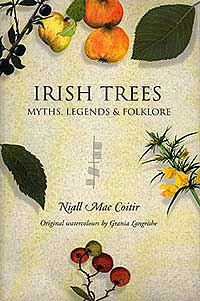 Irish Trees:
Irish Trees:
Myths, Legends and Folklore
by Niall Mac Coitir (water-colours - Grania Langrishe), The Collins Press
Although this book was published in 2003 and
followed with a paperback it is gradually going
out of print.
It should be ubiquitous in every
Irish home, a text for children, an entertainment
for those who understand the importance of trees
to the Irish psyche and a reminder that our
modern lives are still informed by the language
of the trees.
Mac Coitir asserts that this "is a
book for all those frustrated by the [lack of
mention that folklore gets in books about trees]
and who want to know more about the sorely
neglected (and dare I say important) topic of
tree folklore".
It is at once much more than
that. Supported by a grant from the Heritage
Council, The Collins Press have produced a
beautiful book with easy-to-identify pictures of
leaves, berries, flowers and boughs, which are
complimented by the excellent line drawings of
Grania Langrishe. The chapters on the Ogham
alphabet (a tree alphabet used by the Celts) and
on the Ogham tree calendar alone are worth the
price of the book.
Review: RA
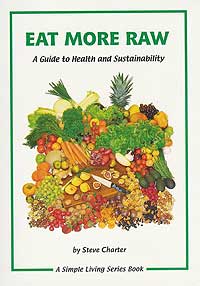 Eat More Raw:
Eat More Raw:
A Guide to Health and Sustainability
by Steve Charter, Permaculture Publications
This could have been a much better book if it had
been aimed at the general population instead of
the elite that concern themselves these days with
the concept and practicality of permaculture.
It is a personal account of the journey Steve
Charter has taken to reach the point in his life
where raw food (the diet of the gatherer) is an
integral aspect of his internal mind-body-spirit
system.
"My main intellectual reasons for eating
as I do are guided by applying ecological
thinking, as well as permaculture ideas and other
ethical considerations and principles to my
choices of what and how I eat. This is
complemented by a healthy dose of well researched
information on diet, nutrition and lifestyle -
including looking at ... what creates sickness,
disease and ill-health, and what creates health."
What Charter wants to do is link raw food with
permaculture and get people to apply to their
lives the philosophies of eco-thinkers like
Robert Hart (who pioneered woodland gardening)
and Bill Mollison (who is regarded as the
inventor of permaculture).
It fails because it is
neither a cookbook nor a philosophy, yet it could
have been both with a little more thought.
Review: RA
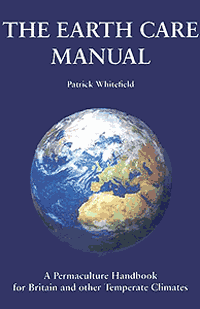 The Earth Care Manual:
The Earth Care Manual:
A Permaculture Handbook
for Britain and other Temperate Climates
by Patrick Whitefield, Permaculture Publications
Organic farmers, permaculturists, forest farmers
and woodland gardeners of these islands (Ireland
and Britain) have been waiting for this book for
a long time.
Bill Mollison's books are fine if
you live in southern Australia, John Seymour's
The Self-Sufficient Gardener if you are rich and
live in utopia, Rodale's How to Grow Vegetables
and Fruits by the Organic Method if you trust
what other growers are telling you about their
specific land and climate and Nicolas Lampkin's
Organic Farming if you are a commercial farmer
wanting a technical manual for converting to
organic.
Whitefield has produced a thick A4-sized
book that complements his work as a permaculture
teacher [though this too is around 40 quid - Ed].
And like the best teaching aids it seeks
to involve the pupil at their own level.
"I'm not here to tell you what to do," Whitefield
proclaims. "My aim is to give you the wherewithal
to make your own decisions. This includes
information, but perhaps more importantly it
includes concepts and perspectives. The most
important thing to know in any situation is which
questions to ask. Then at least we have a chance
of coming up with the right answer. If we ask the
wrong question we have no chance."
There is
little fear that any reader, once they have read
The Earth Care Manual, will ask the wrong
question. This is both a philosophical and
practical guide to understanding why the
production of food is more than mere need.
Permaculture, Whitefield insists, is "the
direction we must go in if we're going to survive
on this planet". It starts with the basics and
principles of permaculture and moves through the
pages to cover climate, water and energy, design
and gardens, farms and food links, fruit, nuts
and poultry, woodland and biodiversity. These
cover the holistic complexity of permaculture,
whether applied in the garden, small holding or
farm.
The book will be a success if it reaches
out to everyone and not just those who have
already been converted.
Review: RA
 The State of the World's Cities:
The State of the World's Cities:
Globalization and Urban Culture
by United Nations Human Settlements Program, Earthscan
The State of the World Atlas:
A Unique Survey of Current Events and Global Trends
by Michael Kidron (Editor), Ronald Segal (Editor), Dan Smith (Editor), Earthscan
The State of the World
by Lester Brown et al, Earthscan
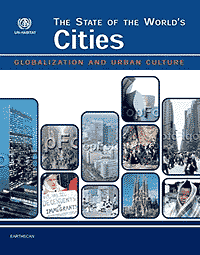 Any student armed with these books, the latter a
series that began in 1984, will have sufficient
statistical ammunition to counter all the
arguments that everything is fine with the
planet, its resources, climate and inhabitants.
Only the ignorant (usually industrialists and
politicians) will argue that human society is not
on a collision course with the inevitable, that
atrophy and collapse are not around the corner,
and that globalisation is not impacting
negatively on our societies.
The State of the World's Cities, a glimpse into
urban culture by the United Nations Habitat
programme, emphasises the argument that
globalisation is having a detrimental effect on
our cities - which have become sinks for
inequality, corruption, crime, violence and the
societal problems that result from deteriorating
living conditions and space, bad and poor diets,
unsafe water, inadequate sanitation and low
incomes.
Any student armed with these books, the latter a
series that began in 1984, will have sufficient
statistical ammunition to counter all the
arguments that everything is fine with the
planet, its resources, climate and inhabitants.
Only the ignorant (usually industrialists and
politicians) will argue that human society is not
on a collision course with the inevitable, that
atrophy and collapse are not around the corner,
and that globalisation is not impacting
negatively on our societies.
The State of the World's Cities, a glimpse into
urban culture by the United Nations Habitat
programme, emphasises the argument that
globalisation is having a detrimental effect on
our cities - which have become sinks for
inequality, corruption, crime, violence and the
societal problems that result from deteriorating
living conditions and space, bad and poor diets,
unsafe water, inadequate sanitation and low
incomes.
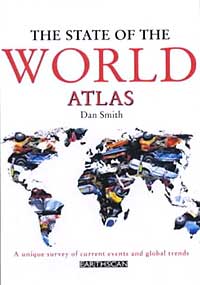 As accessible and readable as this
report is, it is still a UN report and therefore
full of the rhetoric that needs to be funnelled
into positive action rather than discussed in the
ivory towers of the elites.
A more interesting and more direct book is Dan
Smith's The State of the World Atlas.
It covers
with an acute and perspicacious narrative
supported by clear illustrations the elements
that make up our societies - power, the cost of
living, differences, rights, war and force,
money, the business of pleasure, and life and
death.
This is an at-a-glance book that informs
both in picture and in word the state of the
world today.
As accessible and readable as this
report is, it is still a UN report and therefore
full of the rhetoric that needs to be funnelled
into positive action rather than discussed in the
ivory towers of the elites.
A more interesting and more direct book is Dan
Smith's The State of the World Atlas.
It covers
with an acute and perspicacious narrative
supported by clear illustrations the elements
that make up our societies - power, the cost of
living, differences, rights, war and force,
money, the business of pleasure, and life and
death.
This is an at-a-glance book that informs
both in picture and in word the state of the
world today.
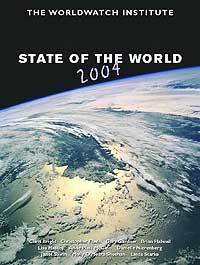 Whereas Worldwatch Institute's The State of World
series is both idealistic and pragmatic. It
celebrates the work of people around the world
who are fighting for change while striving to
highlight the problems facing the world. The
latest volume concerns itself with the impact of
war on our societies.
Sadly the Worldwatch
Institute, a worthy albeit conservative
organisation, is careful, subtitling the book
'Global Security' to ensure that the
administration of Bush and Co is not offended.
It would be easy to offend Bush's administration
because the impact of their nation's policies on
the world are contained in the facts of this
book. Food and water security matter more to the
global population than the senseless and
relentless exploitation of the earth's resources.
Still the Worldwatch Institute's insistence that
the purpose of the book is to show what needs to
be done to build lasting peace and security for
all people is admirable.
Review: RA
Whereas Worldwatch Institute's The State of World
series is both idealistic and pragmatic. It
celebrates the work of people around the world
who are fighting for change while striving to
highlight the problems facing the world. The
latest volume concerns itself with the impact of
war on our societies.
Sadly the Worldwatch
Institute, a worthy albeit conservative
organisation, is careful, subtitling the book
'Global Security' to ensure that the
administration of Bush and Co is not offended.
It would be easy to offend Bush's administration
because the impact of their nation's policies on
the world are contained in the facts of this
book. Food and water security matter more to the
global population than the senseless and
relentless exploitation of the earth's resources.
Still the Worldwatch Institute's insistence that
the purpose of the book is to show what needs to
be done to build lasting peace and security for
all people is admirable.
Review: RA
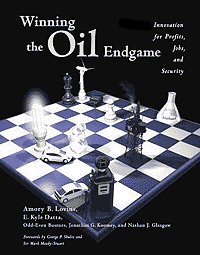 Winning the Oil Endgame:
Winning the Oil Endgame:
Innovation for Profits, Jobs and Security
by George P. Schulz (Foreword), Sir Mark Moody-Stuart (Foreword), Amory B. Lovins, Earthscan/Rocky Mountain Institute
http://www.oilendgame.com
First announced in September 2004,
http://www.ems.org/nws/2004/09/20/us_can_eliminate
when the American media hailed the Rocky Mountain
Institute's report on how to end humanity's
dependence on oil, the book is now available
worldwide.
Despite the eulogies Lovins's
carefully argued report has received from the
audience it has been marketed at - neo-liberal
capitalists and psuedo-liberal greens - those
skeptical of techno-fixes are not convinced.
While the biofuel industry is in full flow in
Europe and many European countries are turning to
hydro-electric, solar, wind and wave energy, it
is the US that gobbles oil and refuses to take
seriously these alternative energy sources.
Lovins acknowleges this: "Europe produces 17
times more biodiesel than we do," he says.
"Unlike previous proposals to force oil savings
through government policy, our proposed
transition beyond oil is led by business for
profit. Our recommendations are market-based,
innovation-driven without mandates, and designed
to support, not distort, business logic. They're
self-financing and would cause the federal
deficit to go down, not up."
An interesting
report, but as one critic put it, if this is Plan
B what is Plan Z?
Review: RA
Reviewers:
RA - Robert Allen
TB - Tim Barton
SB - Steve Booth
ED - Éanna Dowling
EV - Eric Valencic
This page is available for sponsorship
|
|


 Sea
Sea

 Collapse:
Collapse:
 In Search of Michael Dwyer
In Search of Michael Dwyer


 Energy is now a political issue. It ceased to be
an environmental problem many years ago.
Although
slightly out of date (it was first published in
German in 1999), Dr Scheer's book is the bible
for those countries who want to plan a solar
economy as part of their state policy and make
solar energy available to communities. As a
member of the German parliament, Dr Scheer's
analysis is based on the pragmatic choices modern
Germany (and neighbouring Switzerland) had to
make to start introducing a solar economy.
This is the blueprint.
Dr Scheer:
Energy is now a political issue. It ceased to be
an environmental problem many years ago.
Although
slightly out of date (it was first published in
German in 1999), Dr Scheer's book is the bible
for those countries who want to plan a solar
economy as part of their state policy and make
solar energy available to communities. As a
member of the German parliament, Dr Scheer's
analysis is based on the pragmatic choices modern
Germany (and neighbouring Switzerland) had to
make to start introducing a solar economy.
This is the blueprint.
Dr Scheer:
 Irish Trees:
Irish Trees:



 Any student armed with these books, the latter a
series that began in 1984, will have sufficient
statistical ammunition to counter all the
arguments that everything is fine with the
planet, its resources, climate and inhabitants.
Only the ignorant (usually industrialists and
politicians) will argue that human society is not
on a collision course with the inevitable, that
atrophy and collapse are not around the corner,
and that globalisation is not impacting
negatively on our societies.
The State of the World's Cities, a glimpse into
urban culture by the United Nations Habitat
programme, emphasises the argument that
globalisation is having a detrimental effect on
our cities - which have become sinks for
inequality, corruption, crime, violence and the
societal problems that result from deteriorating
living conditions and space, bad and poor diets,
unsafe water, inadequate sanitation and low
incomes.
Any student armed with these books, the latter a
series that began in 1984, will have sufficient
statistical ammunition to counter all the
arguments that everything is fine with the
planet, its resources, climate and inhabitants.
Only the ignorant (usually industrialists and
politicians) will argue that human society is not
on a collision course with the inevitable, that
atrophy and collapse are not around the corner,
and that globalisation is not impacting
negatively on our societies.
The State of the World's Cities, a glimpse into
urban culture by the United Nations Habitat
programme, emphasises the argument that
globalisation is having a detrimental effect on
our cities - which have become sinks for
inequality, corruption, crime, violence and the
societal problems that result from deteriorating
living conditions and space, bad and poor diets,
unsafe water, inadequate sanitation and low
incomes.
 As accessible and readable as this
report is, it is still a UN report and therefore
full of the rhetoric that needs to be funnelled
into positive action rather than discussed in the
ivory towers of the elites.
A more interesting and more direct book is Dan
Smith's The State of the World Atlas.
It covers
with an acute and perspicacious narrative
supported by clear illustrations the elements
that make up our societies - power, the cost of
living, differences, rights, war and force,
money, the business of pleasure, and life and
death.
This is an at-a-glance book that informs
both in picture and in word the state of the
world today.
As accessible and readable as this
report is, it is still a UN report and therefore
full of the rhetoric that needs to be funnelled
into positive action rather than discussed in the
ivory towers of the elites.
A more interesting and more direct book is Dan
Smith's The State of the World Atlas.
It covers
with an acute and perspicacious narrative
supported by clear illustrations the elements
that make up our societies - power, the cost of
living, differences, rights, war and force,
money, the business of pleasure, and life and
death.
This is an at-a-glance book that informs
both in picture and in word the state of the
world today.
 Whereas Worldwatch Institute's The State of World
series is both idealistic and pragmatic. It
celebrates the work of people around the world
who are fighting for change while striving to
highlight the problems facing the world. The
latest volume concerns itself with the impact of
war on our societies.
Sadly the Worldwatch
Institute, a worthy albeit conservative
organisation, is careful, subtitling the book
'Global Security' to ensure that the
administration of Bush and Co is not offended.
It would be easy to offend Bush's administration
because the impact of their nation's policies on
the world are contained in the facts of this
book. Food and water security matter more to the
global population than the senseless and
relentless exploitation of the earth's resources.
Still the Worldwatch Institute's insistence that
the purpose of the book is to show what needs to
be done to build lasting peace and security for
all people is admirable.
Review: RA
Whereas Worldwatch Institute's The State of World
series is both idealistic and pragmatic. It
celebrates the work of people around the world
who are fighting for change while striving to
highlight the problems facing the world. The
latest volume concerns itself with the impact of
war on our societies.
Sadly the Worldwatch
Institute, a worthy albeit conservative
organisation, is careful, subtitling the book
'Global Security' to ensure that the
administration of Bush and Co is not offended.
It would be easy to offend Bush's administration
because the impact of their nation's policies on
the world are contained in the facts of this
book. Food and water security matter more to the
global population than the senseless and
relentless exploitation of the earth's resources.
Still the Worldwatch Institute's insistence that
the purpose of the book is to show what needs to
be done to build lasting peace and security for
all people is admirable.
Review: RA
